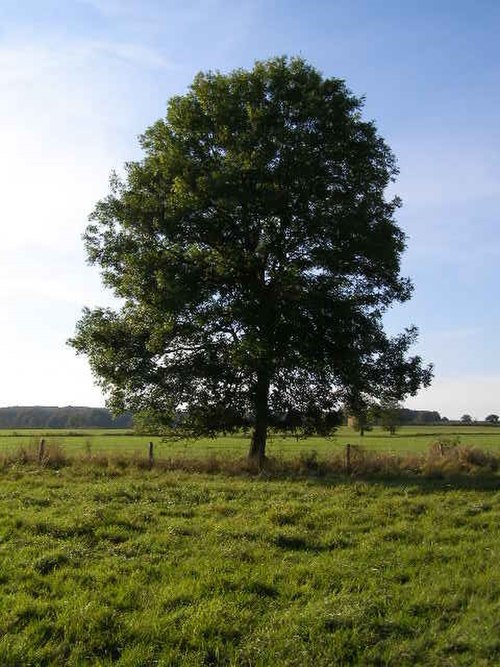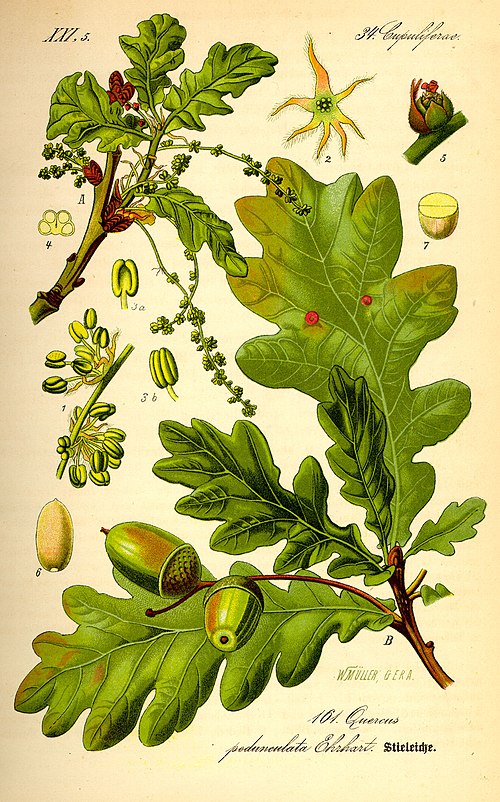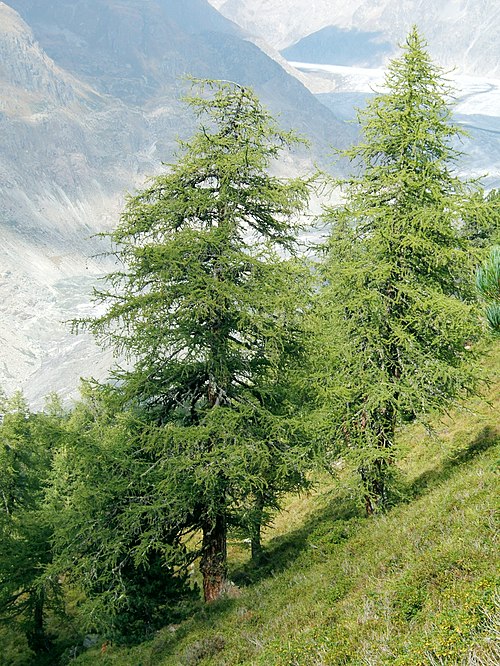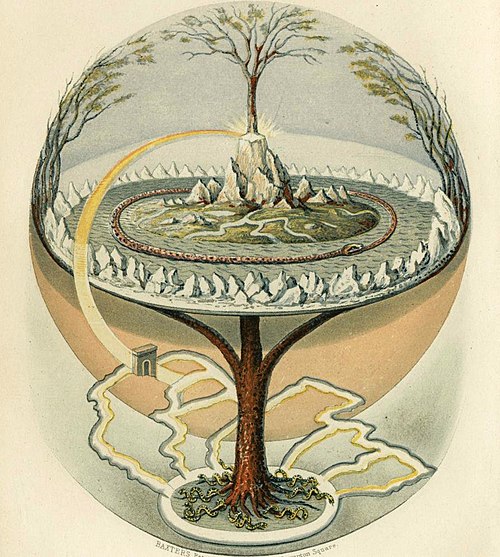Treenoun
(botany) A large plant, not exactly defined, but typically over four meters in height, with a single trunk that grows in girth with age and branches (that also grow in circumference with age).
Treenoun
(botany) Any plant that is reminiscent of the above but not classified as a tree in the strict botanical sense.
Treenoun
An object made from a tree trunk and having multiple hooks or storage platforms.
Treenoun
A device used to hold or stretch a shoe open.
Treenoun
The structural frame of a saddle.
Treenoun
(graph theory) A connected graph with no cycles or, equivalently, a connected graph with n vertices and n-1 edges.
Treenoun
(computing theory) A recursive data structure in which each node has zero or more nodes as children.
Treenoun
(graphical user interface) A display or listing of entries or elements such that there are primary and secondary entries shown, usually linked by drawn lines or by indenting to the right.
Treenoun
Any structure or construct having branches akin to (1).
Treenoun
The structure or wooden frame used in the construction of a saddle used in horse riding.
Treenoun
(slang) Marijuana.
Treenoun
(obsolete) A cross or gallows.
Treenoun
(obsolete) wood; timber
Treenoun
(chemistry) A mass of crystals, aggregated in arborescent forms, obtained by precipitation of a metal from solution.
Treenoun
(cartomancy) The fifth Lenormand card.
Treeverb
(transitive) To chase (an animal or person) up a tree.
Treeverb
(transitive) To place in a tree.
Treeverb
(transitive) To place upon a tree; to fit with a tree; to stretch upon a tree.
Treenoun
Any perennial woody plant of considerable size (usually over twenty feet high) and growing with a single trunk.
Treenoun
Something constructed in the form of, or considered as resembling, a tree, consisting of a stem, or stock, and branches; as, a genealogical tree.
Treenoun
A piece of timber, or something commonly made of timber; - used in composition, as in axletree, boottree, chesstree, crosstree, whiffletree, and the like.
Treenoun
A cross or gallows; as Tyburn tree.
Treenoun
Wood; timber.
Treenoun
A mass of crystals, aggregated in arborescent forms, obtained by precipitation of a metal from solution. See Lead tree, under Lead.
Treeverb
To drive to a tree; to cause to ascend a tree; as, a dog trees a squirrel.
Treeverb
To place upon a tree; to fit with a tree; to stretch upon a tree; as, to tree a boot. See Tree, n., 3.
Treenoun
a tall perennial woody plant having a main trunk and branches forming a distinct elevated crown; includes both gymnosperms and angiosperms
Treenoun
a figure that branches from a single root;
Treenoun
English actor and theatrical producer noted for his lavish productions of Shakespeare (1853-1917)
Treeverb
chase a bear up a tree with dogs and kill it
Treenoun
a woody perennial plant, typically having a single stem or trunk growing to a considerable height and bearing lateral branches at some distance from the ground.
Treenoun
(in general use) any bush, shrub, or herbaceous plant with a tall erect stem, e.g. a banana plant.
Treenoun
a wooden structure or part of a structure.
Treenoun
the cross on which Christ was crucified.
Treenoun
a gibbet.
Treenoun
a thing that has a branching structure resembling that of a tree.
Treenoun
a diagram with a structure of branching connecting lines, representing different processes and relationships.
Treeverb
force (a hunted animal) to take refuge in a tree.
Treeverb
force (someone) into a difficult situation.
Treeverb
(of an area) planted with trees
Tree
In botany, a tree is a perennial plant with an elongated stem, or trunk, supporting branches and leaves in most species. In some usages, the definition of a tree may be narrower, including only wood plants with secondary growth, plants that are usable as lumber or plants above a specified height.
Plantnoun
(botany) An organism that is not an animal, especially an organism capable of photosynthesis. Typically a small or herbaceous organism of this kind, rather than a tree.
Plantnoun
(botany) An organism of the kingdom Plantae; now specifically, a living organism of the Embryophyta (land plants) or of the Chlorophyta (green algae), a eukaryote that includes double-membraned chloroplasts in its cells containing chlorophyll a and b, or any organism closely related to such an organism.
Plantnoun
(ecology) Now specifically, a multicellular eukaryote that includes chloroplasts in its cells, which have a cell wall.
Plantnoun
Any creature that grows on soil or similar surfaces, including plants and fungi.
Plantnoun
A factory or other industrial or institutional building or facility.
Plantnoun
An object placed surreptitiously in order to cause suspicion to fall upon a person.
Plantnoun
Anyone assigned to behave as a member of the public during a covert operation (as in a police investigation).
Plantnoun
A person, placed amongst an audience, whose role is to cause confusion, laughter etc.
Plantnoun
(snooker) A play in which the cue ball knocks one (usually red) ball onto another, in order to pot the second; a set.
Plantnoun
(uncountable) Machinery, such as the kind used in earthmoving or construction.
Plantnoun
(obsolete) A young tree; a sapling; hence, a stick or staff.
Plantnoun
(obsolete) The sole of the foot.
Plantnoun
A plan; a swindle; a trick.
Plantnoun
An oyster which has been bedded, in distinction from one of natural growth.
Plantnoun
A young oyster suitable for transplanting.
Plantverb
(transitive) To place (a seed or plant) in soil or other substrate in order that it may live and grow.
Plantverb
(transitive) To place (an object, or sometimes a person), often with the implication of intending deceit.
Plantverb
(transitive) To place or set something firmly or with conviction.
Plantverb
To place in the ground.
Plantverb
To furnish or supply with plants.
Plantverb
To engender; to generate; to set the germ of.
Plantverb
To furnish with a fixed and organized population; to settle; to establish.
Plantverb
To introduce and establish the principles or seeds of.
Plantverb
To set up; to install; to instate.
Plantnoun
A vegetable; an organized living being, generally without feeling and voluntary motion, and having, when complete, a root, stem, and leaves, though consisting sometimes only of a single leafy expansion, or a series of cellules, or even a single cellule.
Plantnoun
A bush, or young tree; a sapling; hence, a stick or staff.
Plantnoun
The sole of the foot.
Plantnoun
The whole machinery and apparatus employed in carrying on a trade or mechanical business; also, sometimes including real estate, and whatever represents investment of capital in the means of carrying on a business, but not including material worked upon or finished products; as, the plant of a foundry, a mill, or a railroad.
Plantnoun
A plan; an artifice; a swindle; a trick.
Plantnoun
An oyster which has been bedded, in distinction from one of natural growth.
Plantverb
To put in the ground and cover, as seed for growth; as, to plant maize.
Plantverb
To set in the ground for growth, as a young tree, or a vegetable with roots.
Plantverb
To furnish, or fit out, with plants; as, to plant a garden, an orchard, or a forest.
Plantverb
To engender; to generate; to set the germ of.
Plantverb
To furnish with a fixed and organized population; to settle; to establish; as, to plant a colony.
Plantverb
To introduce and establish the principles or seeds of; as, to plant Christianity among the heathen.
Plantverb
To set firmly; to fix; to set and direct, or point; as, to plant cannon against a fort; to plant a standard in any place; to plant one's feet on solid ground; to plant one's fist in another's face.
Plantverb
To set up; to install; to instate.
Plantverb
To perform the act of planting.
Plantnoun
buildings for carrying on industrial labor;
Plantnoun
a living organism lacking the power of locomotion
Plantnoun
something planted secretly for discovery by another;
Plantnoun
an actor situated in the audience whose acting is rehearsed but seems spontaneous to the audience
Plantverb
put or set (seeds or seedlings) into the ground;
Plantverb
fix or set securely or deeply;
Plantverb
set up or lay the groundwork for;
Plantverb
place into a river;
Plantverb
place something or someone in a certain position in order to secretly observe or deceive;
Plantverb
put firmly in the mind;
Plantnoun
a living organism of the kind exemplified by trees, shrubs, herbs, grasses, ferns, and mosses, typically growing in a permanent site, absorbing water and inorganic substances through its roots, and synthesizing nutrients in its leaves by photosynthesis using the green pigment chlorophyll.
Plantnoun
a small plant, as distinct from a shrub or tree
Plantnoun
a place where an industrial or manufacturing process takes place
Plantnoun
machinery used in an industrial or manufacturing process
Plantnoun
a person placed in a group as a spy or informer
Plantnoun
a thing put among someone's belongings to incriminate or compromise them.
Plantnoun
a shot in which the cue ball is made to strike one of two touching or nearly touching balls with the result that the second is potted.
Plantverb
put (a seed, bulb, or plant) in the ground so that it can grow
Plantverb
cover or supply (an area of land) with plants
Plantverb
place a plant in the ground out of doors so it can grow, especially after growing it from seed in an indoor environment
Plantverb
bury (someone)
Plantverb
set or place in a particular position
Plantverb
establish (an idea) in someone's mind
Plantverb
secretly place (a bomb that is set to go off at a later time)
Plantverb
put or hide (something) among someone's belongings to compromise or incriminate the owner
Plantverb
send (someone) to join a group or organization to act as a spy or informer
Plantverb
found or establish (a colony, city, or community)
Plantverb
deposit (young fish, spawn, oysters, etc.) in a river or lake.
Plant
Plants are mainly multicellular organisms, predominantly photosynthetic eukaryotes of the kingdom Plantae. Historically, plants were treated as one of two kingdoms including all living things that were not animals, and all algae and fungi were treated as plants.





















































